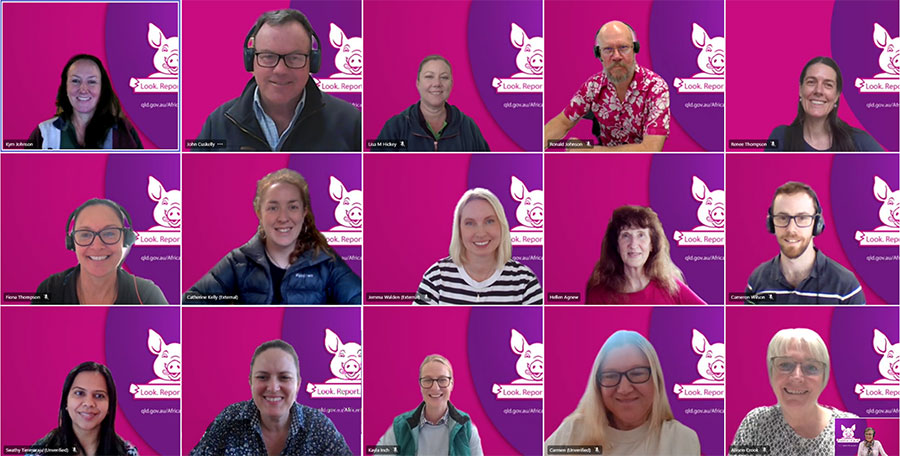Biosecurity Queensland – African swine fever prevention and preparedness project
Biosecurity Queensland is recognised for initiating the African swine fever (ASF) preparedness and prevention project (PPP) in June 2020, in response to the spread of ASF in Asia and the increasing risk to Australia. The project delivered a range of benefits, including:
- supporting the prevention of an ASF incursion in Queensland
- enhanced surveillance for early detection of a potential incursion
- preparedness for an ASF incident response
- stronger relationships with stakeholders
- greater coordination across local, state and federal government.
The project scope was extended in June 2022 to include emergency animal disease (EAD) preparedness in response to the increased threat of foot-and-mouth disease (FMD) and lumpy skin disease (LSD).
Biosecurity Queensland engaged with the pig industry, local government and community stakeholders to collaboratively enhance EAD prevention, early detection and response preparedness. Training and engagement initiatives included:
- developing awareness materials and delivering a social media campaign that targeted culturally and linguistically diverse and Indigenous communities
- developing eLearning courses on
- ASF prevention and early detection
- ASF surveillance and sampling
- delivery of workshops to a broad range of stakeholders to enhance stakeholder networks and their ability to support EAD preparedness.
The project delivered a range of online response-ready tools and included virtual and face-to-face exercises to enhance government and industry response preparedness.
The project delivered an upgrade of the Queensland Biosecurity Sciences Laboratory information management system, providing the flexibility to scale-up at short notice, enabling faster, more consistent and reliable processing of samples during EAD responses.
The project provided practical workshops to support stakeholders’ ability to collaboratively manage feral pigs at the landscape level. Spatial modelling research provided data about feral habitat suitability, landscape use and response to control measures, providing valuable information supporting disease spread models. The project built internal capacity to undertake aerial surveillance activities in an EAD outbreak affecting feral animal populations, including feral pigs.
A grant program supported local governments to develop EAD response plans for integration into their disaster management plans, informed by a collaborative desktop exercise using an ASF response scenario. Grant funding is also supporting ongoing spatial data collection to evaluate the risks of EAD transmission between feral and domestic pig populations and to assess feral pig habitat modelling data for practical application in control programs.
The ASF PPP was completed in June 2024 and received highly positive feedback from stakeholders, who recognised the project’s success in delivering practical initiatives supporting EAD preparedness with a strong focus on collaboration with other state and national government agencies, Indigenous stakeholders and the pig industry sector. The project outcomes and the enduring relationships built have achieved improved biosecurity outcomes and made an outstanding contribution to protecting animal health across Queensland and Australia.
The Biosecurity Queensland African swine fever prevention and preparedness project was nominated by Ian McDonald formerly of Animal Health Australia
Watch a video about their work
Introduction
This is the accessible text transcript of a 2024 Australian Biosecurity Awards winner video featuring Robyn Grob.
Transcript
Hi, my name is Robyn Grob and my role over the past four years has been project manager and team leader for Biosecurity Queensland's African swine fever prevention and preparedness project. I'm delighted to accept the 2024 Australian Biosecurity Award in a Government category on behalf of the project team and the Queensland Department of Agriculture and Fisheries. I'd like to thank Animal Health Australia for nominating the project for this award.
The African swine fever prevention and preparedness project commenced in June 2020, in the midst of COVID restrictions. The project delivered a broad range of initiatives to support emergency animal disease prevention and response preparedness in Queensland and across Australia, including development of online training courses and delivery of educational workshops, developing networks and providing awareness training to encourage early detection and reporting of potential emergency animal diseases in remote areas, including working with Indigenous Rangers, laboratory enhancements to increase sample analysis surge capacity, field research exploring animal carcass decomposition to inform response decision making, delivery of response preparedness exercises with industry and local governments, building capacity to undertake aerial surveillance activities required in a response, and spatial modelling to better understand feral pig ecology to inform disease spread modelling.
The project team included people with a diverse range of skills, including veterinarians, scientists, biosecurity officers, as well as training and engagement specialists, all working together, often via virtual means whilst located across Queensland.
The quality of project outcomes is a testament to the passion, dedication and expertise of the team and the amazing support and guidance from our project board. The project had a strong focus on collaboration with our external stakeholders to ensure that what we delivered was practical and fit for purpose. With this in mind, I'd like to recognise the hugely valuable contribution to project outcomes from the Queensland and Australian pig industry and supply chain partners, national feral pig management and hunting organisations, Natural Resource Management groups, representatives from other Queensland government departments, Queensland local governments, including Indigenous councils, as well as biosecurity departments in other Australian states.
Thank you to the Australian Department of Agriculture, Fisheries and Forestry for this award. This recognition highlights what we can achieve when we all work together in partnership to protect Australia's biosecurity future.




